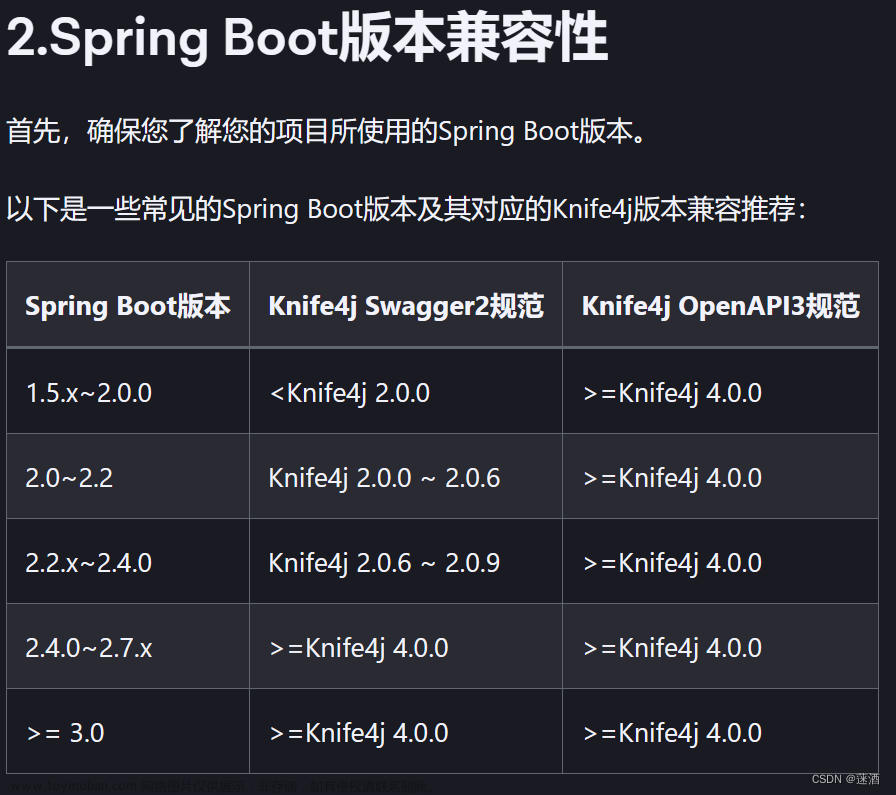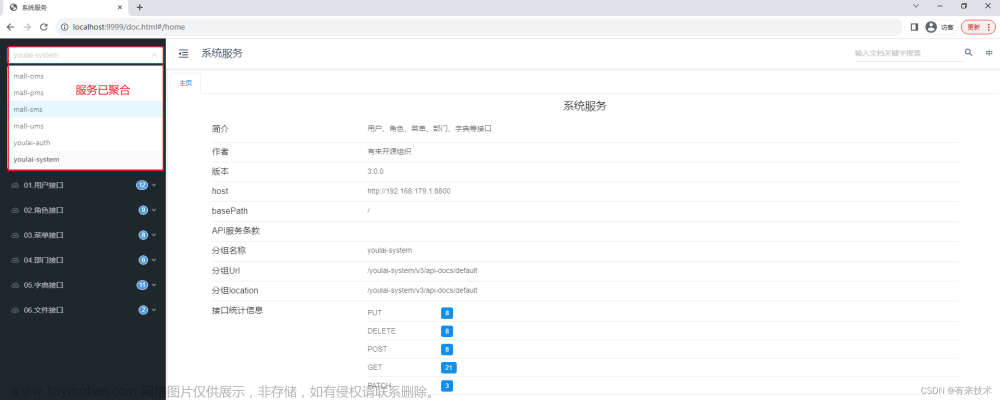目录
1.前置条件
2.导依赖
3.配置
1.前置条件
已经初始化好一个spring boot项目且版本为3X,项目可正常启动。
作者版本为3.2.2
初始化教程:
新版idea创建spring boot项目-CSDN博客https://blog.csdn.net/qq_62262918/article/details/135785412?spm=1001.2014.3001.5501
2.导依赖
knife4j官网:
Knife4j · 集Swagger2及OpenAPI3为一体的增强解决方案. | Knife4j (xiaominfo.com)https://doc.xiaominfo.com/依赖选择:
 作者的使用的spring boot 3.2.2为当前最新版,所以依赖导入最新的knife4j 4.4.0
作者的使用的spring boot 3.2.2为当前最新版,所以依赖导入最新的knife4j 4.4.0
pom.xml:
<dependency>
<groupId>com.github.xiaoymin</groupId>
<artifactId>knife4j-openapi3-jakarta-spring-boot-starter</artifactId>
<version>4.4.0</version>
</dependency>3.配置
官方文档(快速开始):
快速开始 | Knife4j (xiaominfo.com)https://doc.xiaominfo.com/docs/quick-start
官方文档(详细配置):
3.1 增强模式 | Knife4j (xiaominfo.com)https://doc.xiaominfo.com/docs/features/enhance
application.yml:
springdoc:
swagger-ui:
path: /swagger-ui.html
tags-sorter: alpha
operations-sorter: alpha
api-docs:
path: /v3/api-docs
group-configs:
- group: '蒾酒'
paths-to-match: '/**'
#生成文档所需的扫包路径,一般为启动类目录
packages-to-scan: com.mijiu
#knife4j配置
knife4j:
#是否启用增强设置
enable: true
#开启生产环境屏蔽
production: false
#是否启用登录认证
basic:
enable: true
username: admin
password: 123456
setting:
language: zh_cn
enable-version: true
enable-swagger-models: true
swagger-model-name: 用户模块写个接口:
@Tag注解:标记接口类别
@Operation:标记接口操作
@RestController
@Tag(name = "用户接口")
@RequestMapping("/user")
public class UserController {
private final UserService userService;
public UserController(UserService userService) {
this.userService = userService;
}
@GetMapping("/list")
@Operation(summary = "用户列表")
public List<User> test(){
return userService.list();
}
@Operation(summary = "你好")
@GetMapping("/hello")
public Object test2(){
return "hello";
}
}启动项目:
浏览器输入:http://ip:port/doc.html


接口已经识别到了
接下来配置以下接口文档的作者等信息
在config目录下新建配置类:

import io.swagger.v3.oas.models.OpenAPI;
import io.swagger.v3.oas.models.info.Contact;
import io.swagger.v3.oas.models.info.Info;
import org.springframework.context.annotation.Bean;
import org.springframework.context.annotation.Configuration;
/**
* @author mijiupro
*/
@Configuration
public class Knife4jConfig {
@Bean
public OpenAPI springShopOpenApi() {
return new OpenAPI()
// 接口文档标题
.info(new Info().title("蒾酒的demo")
// 接口文档简介
.description("这是基于Knife4j OpenApi3的测试接口文档")
// 接口文档版本
.version("1.0版本")
// 开发者联系方式
.contact(new Contact().name("蒾酒")
.email("000000000@qq.com")));
}
}重启项目,再次访问

每次都要打开浏览器输入地址访问不友好
启动类上优化:
@SpringBootApplication
@MapperScan("com.mijiu.mapper")
@Slf4j
public class SpringbootTemplateApplication {
public static void main(String[] args) {
SpringApplication app = new SpringApplication(SpringbootTemplateApplication.class);
Environment env = app.run(args).getEnvironment();
app.setBannerMode(Banner.Mode.CONSOLE);
logApplicationStartup(env);
}
private static void logApplicationStartup(Environment env) {
String protocol = "http";
if (env.getProperty("server.ssl.key-store") != null) {
protocol = "https";
}
String serverPort = env.getProperty("server.port");
String contextPath = env.getProperty("server.servlet.context-path");
if (StringUtils.isBlank(contextPath)) {
contextPath = "/doc.html";
} else {
contextPath = contextPath + "/doc.html";
}
String hostAddress = "localhost";
try {
hostAddress = InetAddress.getLocalHost().getHostAddress();
} catch (UnknownHostException e) {
log.warn("The host name could not be determined, using `localhost` as fallback");
}
log.info("""
----------------------------------------------------------
\t应用程序“{}”正在运行中......
\t接口文档访问 URL:
\t本地: \t\t{}://localhost:{}{}
\t外部: \t{}://{}:{}{}
\t配置文件: \t{}
----------------------------------------------------------""",
env.getProperty("spring.application.name"),
protocol,
serverPort,
contextPath,
protocol,
hostAddress,
serverPort,
contextPath,
env.getActiveProfiles());
}
}效果如图:

点击直接跳转。文章来源:https://www.toymoban.com/news/detail-818261.html
完成!文章来源地址https://www.toymoban.com/news/detail-818261.html
到了这里,关于Spring Boot3整合knife4j(swagger3)的文章就介绍完了。如果您还想了解更多内容,请在右上角搜索TOY模板网以前的文章或继续浏览下面的相关文章,希望大家以后多多支持TOY模板网!













